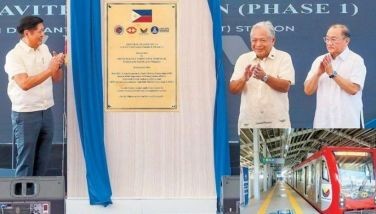Escudero: Cha-cha to kill impeachment bid vs erring presidents
June 4, 2006 | 12:00am
Changing the country’s form of government from the current US-style presidential form to a parliamentary system could kill future bids to impeach erring presidents, House Minority Leader Rep. Francis Escudero of Sorsogon warned again yesterday.
The opposition in the House is preparing its second impeachment complaint against President Arroyo on several charges, including corruption.
"Charter change will kill the impeachment move we are preparing against President Arroyo," Escudero told a media forum, referring to efforts of Mrs. Arroyo and her allies to amend the Constitution and shift to a parliamentary system.
Allaying the opposition’s fears, Raul Lambino, spokesman for the Sigaw ng Bayan movement which is the main proponent of the proposed shift to a parliamentary system, said provisions are in place that would enable the parliament to remove an erring president by a simple majority vote.
"The process of removal is: simple loss of confidence means ouster from office. No more trial in the Senate," Lambino explained at the same press forum.
Mrs. Arroyo wants the country to adopt a parliamentary system, which she said would speed up passage of legislation needed for economic recovery.
Escudero had earlier charged that the administration was "moving heaven and earth" to push for a parliamentary system to preempt another impeachment complaint that the opposition reportedly plans to file in July.
Mrs. Arroyo survived an impeachment bid in September last year over allegations of cheating in the May 2004 elections, among other charges.
Under the law, only one impeachment complaint can be filed within a one-year period against the same official, preventing the opposition from filing a new impeachment complaint against Mrs. Arroyo until mid-July.
Escudero pointed out that a vote by one-third of the House is enough to impeach the president and send the impeachment complaint to the Senate, which will sit as the impeachment court. A two-thirds vote is required for a conviction.
Escudero argued that there is a greater chance of ousting an erring president through impeachment under the current form of government than under a parliamentary system.
Under the proposed amendments to the Constitution being considered by Arroyo allies, the envisioned parliament would form an impeachment panel that would study complaints lodged against the president and other impeachable officials.
Since administration allies would dominate the unicameral legislature, they would naturally control the study panel and the impeachment process, Escudero predicted.
Therefore, he said, the required vote of two-thirds of all members of parliament — including Cabinet members who would sit in the legislature — would be impossible to attain.
Escudero appealed to Arroyo allies in the House to look at the impeachment process as an accountability mechanism.
He pointed to the impeachment of Joseph Estrada, Mrs. Arroyo’s predecessor. In late 2000, Estrada’s opponents mustered the backing in the House to send the impeachment complaint to the Senate.
However, the impeachment trial ended in a farce when pro-Estrada senators outvoted the opposition in throwing out key evidence.
The Senate vote sparked massive street protests that eventually turned into a popular uprising that ousted Estrada in 2001.
Estrada is currently on trial for allegedly running an illegal gambling protection racket and amassing billions of pesos from payoffs during his 30 months in office. He was succeeded by Mrs. Arroyo, who was then the vice president.
The opposition in the House is preparing its second impeachment complaint against President Arroyo on several charges, including corruption.
"Charter change will kill the impeachment move we are preparing against President Arroyo," Escudero told a media forum, referring to efforts of Mrs. Arroyo and her allies to amend the Constitution and shift to a parliamentary system.
Allaying the opposition’s fears, Raul Lambino, spokesman for the Sigaw ng Bayan movement which is the main proponent of the proposed shift to a parliamentary system, said provisions are in place that would enable the parliament to remove an erring president by a simple majority vote.
"The process of removal is: simple loss of confidence means ouster from office. No more trial in the Senate," Lambino explained at the same press forum.
Mrs. Arroyo wants the country to adopt a parliamentary system, which she said would speed up passage of legislation needed for economic recovery.
Escudero had earlier charged that the administration was "moving heaven and earth" to push for a parliamentary system to preempt another impeachment complaint that the opposition reportedly plans to file in July.
Mrs. Arroyo survived an impeachment bid in September last year over allegations of cheating in the May 2004 elections, among other charges.
Under the law, only one impeachment complaint can be filed within a one-year period against the same official, preventing the opposition from filing a new impeachment complaint against Mrs. Arroyo until mid-July.
Escudero pointed out that a vote by one-third of the House is enough to impeach the president and send the impeachment complaint to the Senate, which will sit as the impeachment court. A two-thirds vote is required for a conviction.
Escudero argued that there is a greater chance of ousting an erring president through impeachment under the current form of government than under a parliamentary system.
Under the proposed amendments to the Constitution being considered by Arroyo allies, the envisioned parliament would form an impeachment panel that would study complaints lodged against the president and other impeachable officials.
Since administration allies would dominate the unicameral legislature, they would naturally control the study panel and the impeachment process, Escudero predicted.
Therefore, he said, the required vote of two-thirds of all members of parliament — including Cabinet members who would sit in the legislature — would be impossible to attain.
Escudero appealed to Arroyo allies in the House to look at the impeachment process as an accountability mechanism.
He pointed to the impeachment of Joseph Estrada, Mrs. Arroyo’s predecessor. In late 2000, Estrada’s opponents mustered the backing in the House to send the impeachment complaint to the Senate.
However, the impeachment trial ended in a farce when pro-Estrada senators outvoted the opposition in throwing out key evidence.
The Senate vote sparked massive street protests that eventually turned into a popular uprising that ousted Estrada in 2001.
Estrada is currently on trial for allegedly running an illegal gambling protection racket and amassing billions of pesos from payoffs during his 30 months in office. He was succeeded by Mrs. Arroyo, who was then the vice president.
BrandSpace Articles
<
>
- Latest
- Trending
Trending
Latest
Trending
Latest
Recommended






























